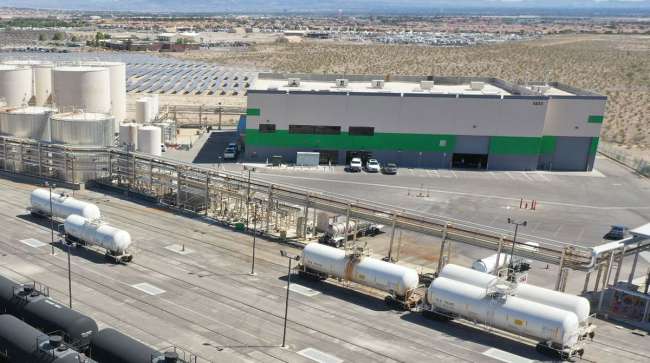Staff Reporter
Nevada Lands Renewable Diesel Production, Distribution Hub

[Stay on top of transportation news: Get TTNews in your inbox.]
Nevada Gov. Joe Lombardo has approved $11.7 million in tax abatements as a business incentive to Edgewood Renewables to help the company create a biofuel refinery hub that would produce 120 million gallons of renewable diesel and sustainable aviation fuel annually.
Lombardo and the state Governor’s Office of Economic Development jointly announced on Jan. 25 the biofuel project plus tax abatement deals for two other companies with a total of $14.5 million in tax incentives in return for the creation of 148 jobs within two years and 71 additional jobs within five years from the three companies.
GOED, created during the 2011 session of the Nevada Legislature, is a collaborative effort between the Legislature and the governor’s office to restructure economic development in the state.
“We could not be more excited to be locating the Edgewood Renewables refinery, fuel hub and terminal in North Las Vegas, Nevada,” Edgewood CEO Steve Harrington said. “The site not only provides us with strategic access points to our key markets but also an incredible workforce that we hope to continue to build with.”

Harrington
The city of North Las Vegas is the municipality partner in the deal with Edgewood Renewables. That project is expected to create 60 new jobs with an average weighted hourly wage of $40.71. The company is moving forward with plans to operate a rail transload facility and refinery production/distribution plant in North Las Vegas. It expects to produce 9,000 barrels (120 million gallons) per day of renewable diesel and sustainable aviation fuel using waste from agricultural oils and animal fats.
“Ultimately, we chose Southern Nevada because we felt wanted and welcomed,” Harrington added. “The state of Nevada and its citizens share an optimism and enthusiasm for creating opportunities through business, and we look forward to being a great partner in achieving that mission.”
Ben Gardiner, a cybersecurity expert at the National Motor Freight Traffic Association, shares practical, effective strategies to shield your business. He offers insights into operating systems and a comprehensive guide to cyber resilience. Tune in above or by going to RoadSigns.ttnews.com.
Edgewood Renewables is expected to invest $96.5 million in capital equipment during the first two years of operation and generate $21.6 million in new tax revenues over the 10-year abatement period.
In October, North Las Vegas helped pave the way for the venture to be located there by working with U.S. Energy, which will operate the biofuel hub after it signed a long-term agreement with Edgewood Renewables, which will build the facility at a former fuel terminal.

Goynes-Brown
“The city of North Las Vegas continues to solidify our legacy as the ideal location for companies looking to build, expand or relocate to,” Mayor Pamela Goynes-Brown said at that time. “Our proximity to major transportation lines, including highway and rail, gives companies like U.S. Energy improved operational efficiencies and the ability to offer expedited freight services.”
Nevada’s GOED offers incentives to help convince companies to do business there. Inducements include sales tax abatements on capital equipment purchases, sales/use tax deferrals on capital equipment purchases, abatements on personal/modified business taxes, real property tax abatements for recycling, help with the cost to develop intellectual property and employee training grants.
To qualify, a company must maintin the business in Nevada for five years and perform two of the following: offer jobs paying the average state wage, make capital investments or create primary jobs. Approval also requires companies to offer medical insurance to employees and pay at least 65% of the insurance premium costs.
Want more news? Listen to today's daily briefing below or go here for more info:





